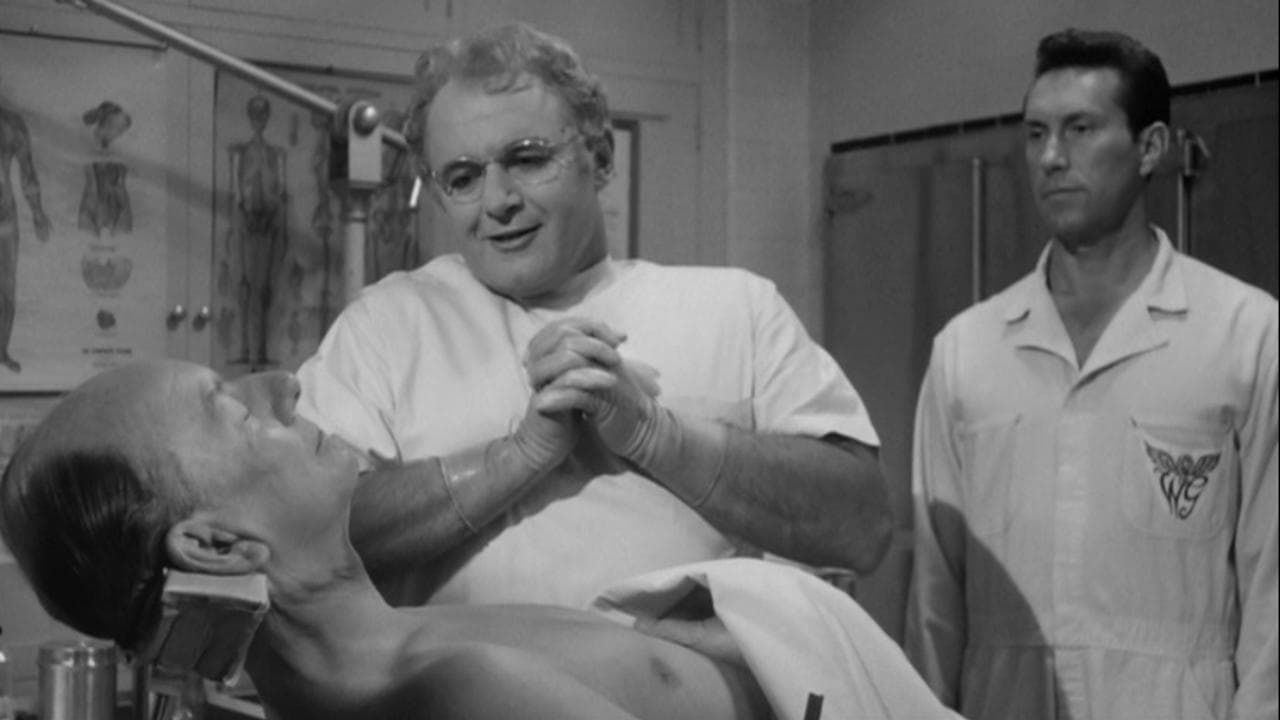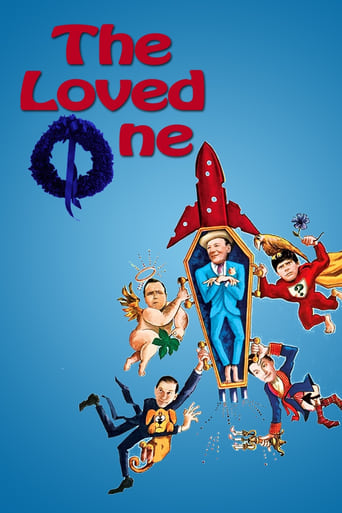

Well, let me tell ya - With its assurance of "containing something in its story to offend everyone" (literally) - I'd say that "The Loved One" completely fell flat on its stupid face by not living up to this false promise.You know, I really wish that "The Loved One" had succeeded in offending me. 'Cause, perhaps, that way I might have found something to actually like about this insufferably dry and totally uninspiring comedy. But, sorry, as it turned out, "The Loved One" was just too bloody stupid to offend, except, maybe, those who are brain-dead.Adapted for the screen from the Evelyn Waugh novel of the same name, I personally think Waugh's morbid piece of fiction translated terribly into this dull, 1965 motion picture. If you ask me, I'd swear that they were actually just making up the story as they went along.Now 50 years old, I found "The Loved One's" story to be grossly out of date, as well as being way too out of touch with reality, to ever appeal to a rational-thinking person like myself.It certainly didn't help matters much that all of the characters in this tale were a completely unlikable bunch. I mean, I don't mind eccentric characters, but when that eccentricity becomes annoying (as it did with this lot), it just grates on my nerves like you wouldn't believe.About the only thing that this lame-brained comedy could boast about (to its advantage) would be its list of cameo appearances from the likes of Dana Andrews, Tab Hunter, James Coburn and Milton Berle, to name but a few.
... View MoreDirector Tony Richardson takes no prisoners as he lambastes the funeral business, the government, religion, ideology, and anything else held sacred by many. Richardson does this in the most comically satiric manner with subtlety, restraint at times, over-indulgence at other moments, and a unique blend of English reservedness and wit mixed with American vulgarity and frankness. I loved this film and was laughing throughout. The story starts off with a young Englishman(Robert Morse) arriving in LA with no job or prospects other than visiting his famous uncle John Gielgud - who is in the movie business. Gielgud invites the young man to stay, introduces him to the strong acting British community, and provides him with living essentials as the young man decides what to do with his life(apparently after a romantic break). We see Gielgud at work and Richardson has no problems making fun of the movie industry at all as Gielgud, a veteran of 31 years, has been reduced to helping an American hick become an Englishman - not even remotely possible. He fails, is let go, and hangs himself. At this point we have a wonderful satire about the film industry, but what follows balloons into something even more grandiose. Character actor Robert Morley insists that this man be buried at the best place possible - Whispering Glades. We then watch Morse go there and see the hyperbolic excesses of the funereal business for those who least need their services - the dead. Morse meets beautiful Anjanette Comer, a make-up artist for the dead, as well as a series of people to help bring his uncle to "peace." Richardson, taking Waugh's novel, really has a knack at steamrolling his satire here with decadent grounds, huge rooms for repose, a bureaucratic network designed only for the wealthy, white, and people of "merit." Liberace, giving a great performance, plays a man who helps Morse decide on what casket, suit, and even shoes his dead uncle will have. The film then turns into a myriad of directions from a rich reverend who has a godlike complex but only a desire to make money, the help of the government to foster this big business, and a romantic triangle like no other with Morse, Comer, and Rod Steiger as Mr. Joyboy - the chief embalmer. While the end of The Loved One does not carry the impact now that it did in 1965, the film as a whole is a witty, incredibly black comedy de farce in many ways. Richardson made a film his way with his ideals firmly planted. Yes, this film will and I am sure did offend many. It also opens one's eyes to a number of things. The acting is great with Morse doing very solid work. Comer, as I said before, is lovely. Steiger - Steiger is great! His Mr. Joyboy with effeminacy reeking, long white curls, and fastidious outfits matched with his outlandish hand gestures steals every scene he is in...EXCEPT the ones with his mother(more on that shortly). His accented dialog was a real treat to hear. "I am saving for Momma's big tub!" His mother, "every inch a queen," is in one of the most bizarre film scenes I have ever seen in any "mainstream" picture. Words fail me. See it. I shall never look at a roast pig again - or a turkey - in the same way. I could go on, but I think you get my favorable stance toward this film which is most definitely under-viewed. Jonathan Winters is superb as well in two roles. Catch Paul Williams in his first film role. Watch Milton Berele give a great cameo as a husband fighting with his wife over a bereaved loved one. What a funny scene that was too!
... View MoreI must admit that for a while during this film, I wasn't very impressed. However, the longer it went, the weirder and more offensive it became---and I really liked that! Back in 1965, it was seen as very sick and offensive. However, given societal changes, it's only a bit sick and offensive today...and well worth your time.The film begins with Dennis (Robert Morse) moving from England to Los Angeles. He moves in with his uncle (John Gieldgud) and this part of the film and its look into Hollywood didn't particularly interest me--especially since I had heard about how wacky the film was. But, when the uncle kills himself, Morse is taken into the world of the funeral industry....and then it gets mega-strange. You are taken into the bizarre world of some ultra-fancy cemetery run by a very odd reverend (Jonathan Winters). Then, Morse gets a job at a pet cemetery--and it gets stranger. I could tell you a lot more about all this, but think you just need to see it for yourself. Be sure to look for some very odd and funny cameos--particularly Liberace as a coffin salesman and a great bit with Milton Berle. I also loved the lady with the suckling pig--again, you need to see it for yourself.The film works because it is very outrageous and silly. It also works because so much of the humor is very dry and underplayed--with folks reacting pretty normally when insane things happen all around them. I think the best thing to say about the film was said by my youngest daughter when she said "This is really funny for an old movie"! Clever and sick...and a lot of fun.
... View MoreIt's the 60s and when a movie is set in a certain place, there's a decent chance it will be filmed there. It was a great stroke of luck for this movie's longevity that it received location photography. The B&W photography looks terrific!There's an art to black comedy. While there are certainly laughs in this; (A precarious, collapsing house. Aimee kicking the condemned sign and having it shoot out over the house. Roddy MacDowell receiving a goofy scalp massage.); the story is just too flimsy to carry on for 2 hours. Robert Morse is simply not very good and I never had any interest in the main plot line. Around the time Morse begins pursuing airhead Aimee, it becomes a long turnoff. I couldn't be bothered with whether such a dumb guy can win the bimbo. There isn't a moment of his pursuit that I care about. I also cannot get past what a homely dork he is. And if Morse can't do an English accent, just change the part. His poor attempt is a complete distraction. However funny audiences found Morse to be in the 60s, he just doesn't have an ounce of natural humor; He didn't get a single laugh out of me. That is not good when he's on screen so much. That's two strikes you can't recover from; a bad lead actor, and a dead plot line. Strike three is that every single character is a hopeless idiot.There are many times this feels like it's being oddball, strictly for the sake of being oddball. Only Liberace, as a deeply cynical casket salesman, rises to the occasion, gets the tone right and knocks it out of the park. No, Rod Steiger cannot do comedy.Rushmore takes the "two guys fighting over a girl" schtick and with good casting, a dry script and a point, delivers a comedy miracle.
... View More